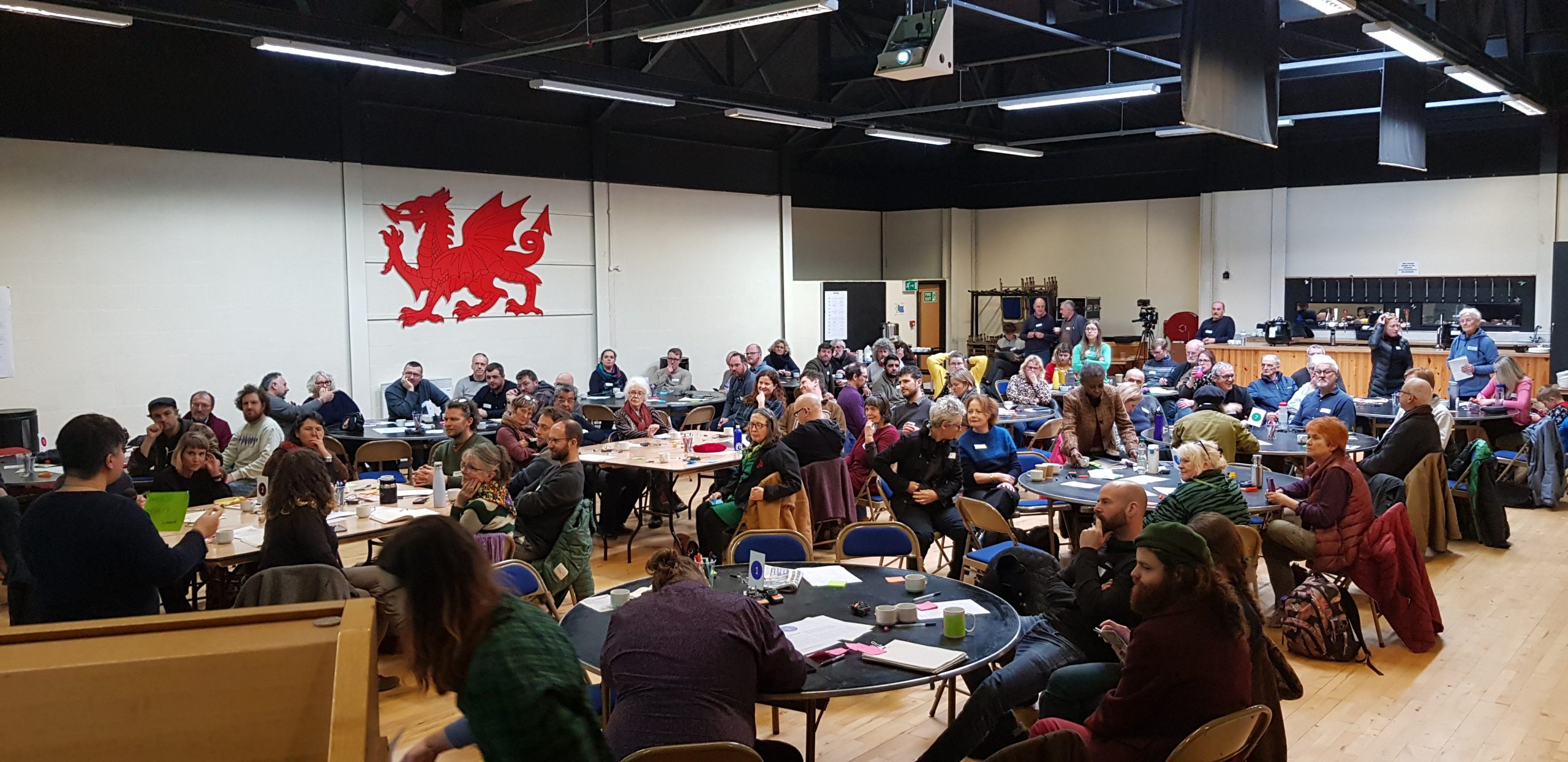Jeff Smith reports on the results of a conference organised by Siarter Cartrefi bringing together grassroots campaigners taking action on the housing crisis.
 In February this year, an event was held in Machynlleth to discuss the housing situation in Wales. With over 100 contributors from a wide range of movements and institutions, a flourishing of ideas developed, encouraging action in housing and beyond.
In February this year, an event was held in Machynlleth to discuss the housing situation in Wales. With over 100 contributors from a wide range of movements and institutions, a flourishing of ideas developed, encouraging action in housing and beyond.
As is widely acknowledged, large parts of Wales, if not the entire country, face a housing crisis. From Ynys Môn to Monmouth, many local people find it impossible to buy a house and rents are rising much faster than wages. The purpose of the conference was to bring groups, social movements, institutions and individuals from related fields, each with their particular expertise, to recognise problems and solutions.
As was frequently raised, housing problems are an existential threat to the communities where the Welsh language is still strong. It was noted that there is fundamental economic inequality as people from wealthy areas can pay much higher sums for houses than local people on local wages. The result of this is that local people are being priced out of the market and cannot stay in their communities, with adverse consequences for language, culture and community activity. This also contributes to a shortage of key workers in such areas. Often houses are used as second homes or holiday accommodation. In Ceredigion for instance prices are around ten times income and in Gwynedd 65 per cent of local people are priced out of the housing market. But the problem with the housing market extends to all parts of Wales as well. For instance, in urban areas the buy to let boom has reduced how many houses are available for sale, pushing house prices beyond the reach of local people.
One of the themes regarding this was regulation of the housing market. It was felt that the market is not delivering for people and therefore intervention is required to control it. It was noted that this already happens in numerous parts of Europe with positive consequences for people and communities.
Another theme was the need for a statutory right to local, adequate housing. Many people live in worse conditions than would be expected in a wealthy country and this needs to be tackled. The right to accommodation also needs to be extended and strengthened, making it a right to a home, locally. It was felt that this was very important from a rights viewpoint and for sustaining communities.

There was much support for the revamping of the planning system. It was felt that the present system makes it difficult for local voices to be heard and makes it difficult for councils to represent the wishes of communities. It was felt that the present system works mainly for developers, whereas community interests should be paramount.
Contributors were also keen to see more truly affordable housing for people on local wages, ideally through cooperative ventures or Community Land Trusts (CLTs). It was of course noted that ‘affordable housing’ under its present definition is often not affordable to many people!
Systemic change
Many contributors noted that the situation cannot be seen in isolation. There were many calls for systemic change, dealing with subjects such as community assets, environmental considerations, tourism and co-ownership.
There was a strong feeling that more power needs to be devolved, especially from Westminster, but also from Cardiff Bay, in order to empower communities and ensure that they can implement the solutions which suit their circumstances. Communities know best what is needed in their area but the present system hoards power centrally. It was felt that wealth also needs to be devolved, for instance by devolving the huge coastal profits of the Crown Estates to disadvantaged communities along the coast.
The environment is also a major factor and people felt that careful co-working with nature was required through careful planning. After all, there are huge benefits of having nature on your doorstep. Building more energy efficient homes also reduces fuel bills for the owners/tenants.
It was also felt that the industrial model of rural Wales and the structure of the tourist industry needs reform. It was felt that the present tourism system, with seasonal jobs on low wages and use of the housing stock to accommodate tourists, is not working for communities. Participants wanted to see communities taking more ownership of the sector and seeing more of the benefits.
Next steps
Siarter Cartrefi is very grateful to the Welsh Government for funding the conference and looks forward to taking this further. We would like to see a Citizens Assembly meet to discuss further some of the themes raised and how action could be taken to bring about change.
Jeff Smith is a member of Siarter Cartrefi and is also a town councillor in Aberystwyth and chairs Cymdeithas yr Iaith’s Sustainable Communities Group